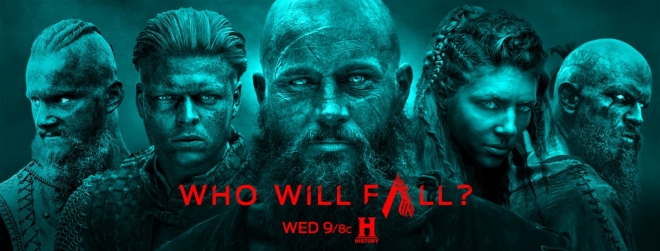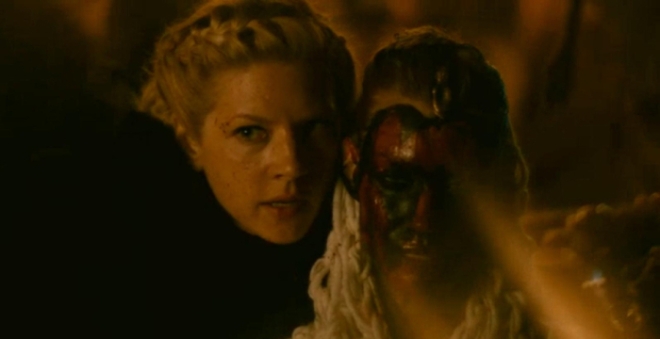I touched on the current History Channel series Vikings in my review of 1958’s The Vikings, not to be confused with my review of 1928’s The Viking. So as you can see there’s a certain amount of Viking presence on the blog already. I watched the first season on Lovefilm back when it first appeared there, and now that the second season is available and I have nothing in particular to do this evening, I thought I’d sit down and watch the first episode and just sort of … ponder on it.
Before I begin with the second season, let’s think about the first.
I’m not one of those people who complains when the change the history in — no, I can’t keep it up. I’m totally one of those people. But I usually try to understand why those changes have been made — to make the story easier to understand, to simplify things, generally to make a confusing mixture of circumstances more story-like. But I find some of the changes made in Vikings to be absolutely baffling.
I get that if there’s a famous Viking anti-hero, it’s probably Ragnar Lothbrok (Ragnar, I am not making this up, “Hairy-breeks”). And I’m _maaaaaaybe_ willing to accept that he is sufficiently famous that some people who don’t really know much about him have heard of him. (The real answer is Erik Bloodaxe, but his story resists being the kind of story this show wants to tell.) But I refuse to believe that there is anyone who has heard of Hrolf/Rollo/Robert I but who doesn’t know anything about him. Anyone who isn’t French, anyway. Robert I isn’t exactly Billy the Kid or Robin Hood, a name that stands for a certain type of adventure. So if you’re going to make him Ragnar’s brother and effectively a completely different character — and get his names inexplicably backward — why even bother making him Hrolf/Rollo in the first place? It’s really weird.
I’m not going to nitpick detail mistakes in this show, because we’d be here all night. But let me state before we jump in to Season 2 that my impression of Season 1 was that as history it was balls but as a show it was a lot better than I was expecting. I wasn’t expecting much, though, so will Season 2 suffer from the expectations raised by the previous one? I’m just going to blog my thoughts about this thing as I watch it. Necessarily this involves spoilers.
Anyway, we begin with Ragnar and his ally King Horik about to face off against Rollo and his ally Jarl Borg. Horik is Donal Logue, which is so weird. I know he was on TV in some show I didn’t watch, but to me he’s always Dex from The Tao of Steve, or possibly the guy from Blade.

I think it’s super interesting that this kind of desaturated, greyish colour has become the signifier for gritty, historical action-drama. It doesn’t have an earlier pedigree than Saving Private Ryan, does it? Because it’s in fucking everything.
Anyway, there are some tense pre-battle negotiations. I like Rollo as a character — this really capable, gifted guy who somehow can’t stop screwing up and feeling inferior. The battle is about to commence. The battle shows one of the reasons the show tells the kinds of stories it does: because its budget doesn’t stretch to proper battles. There are only a couple of dozen guys on each side, and it doesn’t look very impressive.

No doubt a lot of work and expense, but still.
The battle scene is nice and visceral, very dramatic and exciting, with even the ordinary vikings getting to show off a bit before Rollo goes Kung Fucking Foo on a bunch of guys, including weaselly little villain whatsisname, you know, Gustav Skarsgard’s character, The Crazy One.
The music here is like Scandinavian folk-rock stuff, which of course has shit-all to do with the Viking Age, but at least it isn’t the same old pseudo-Lord of the Rings bombast that’s in every movie. Can I say also that the opening credits to this show are great?
Damn, Rollo is going to town on these guys? I do not think it makes a huge amount of sense that he is behind Ragnar’s lines and no one is paying him any attentions, but it’s very dramatic.
Oh, the battle just went into ears-ringing-o-vision, just like Private Ryan again? Did a shell go off next to their 8th-century heads?
Rollo gives up and decides he isn’t gonna fight Ragnar anyway. It would have been nice of him not to kill like ten fucking guys first.
The battle ends inconclusively, I guess, and the two rivals hammer out peace talks, which I think is not too unreasonable. Ragnar suggests that they can team up and loot England rather than squabbling over Denmark. (One of my Norwegian students pointed out that this is a very stark and dramatic looking Denmark.)
Gustav Skarsgard’s guy is called Floki.

OK, this looks pretty good. I’m not gonna lie. The village looks pretty good too, and the outfits on the women and other civilians aren’t too terrible. I mean, not accurate in every particular, but, you know, wool dresses and cloaks and stuff. I know that the reason there isn’t a lot of T&A in this show is probably just that the History Channel can’t get away with it, but it’s such a relief in a way that you don’t notice until a few episodes have gone by without any gratuitous nudity. Also, did I know that Rollo’s wife is the actress who played Mrs Schuester on Glee?
Bjorn has a great Norman haircut. He looks like he just came off the Bayeux Tapestry, which is to say he looks pretty stupid, but almost-authentically stupid.
Ragnar’s infidelities are starting to come back to haunt him. His wife doesn’t take any crap. Part of me wishes she could be a take-no-crap character without having to swing an axe at people. I’m not wholly committed to that position, but I think there’s a case to be made. I like that Ragnar is kind of high on his own success and thinks that he can get away with anything.
The gold coin that Ragnar shows Bjorn is huge.
The “assembly” at “the law rock” has aspects of both town hall meeting and lynch mob, which I think is true to the sagas, although I have my doubts about its procedural accuracy.
What the hell do they sew up the seams of their clothes with? It looks like electrical cable. Ragnar’s simultaneous judge-bribing and goo-goo-principle spouting is inspiring. What a dirtbag. Rollo says “I wanted to step out of your shadow.” No shit, Rollo, everyone knew that but you.
Everyone in this show emphasises their t-sounds really hard. It’s strange. Is it because pronouncing them like ‘d’ sounds really American? Ragnar is sad about his dead daughter, in a scene that has this weird interesting blurry effect. The scenery is doing a lot of the emotive work here.
Oh Christ, then fucking Aslaug or whatever she was called shows up. I didn’t think much of her last season, but I have to say this is a nice shot. I like the kind of quasi-uniform her attendants are wearing, but also how they’re just four ordinary-looking women, not some nymph brigade, which is what I was afraid of. Aslaug is knocked up. Is she gonna be Ivarr’s mum? They said Ivarr was going to be a character, but considering he hasn’t been born yet they’ll have to jump pretty far forward …

Great touch: as Ragnar and his family get their shit together to receive the visiting princess, some little goats come along with them, mehh-ing through the welcome and all the social tension. Lagertha does a great job with the whole “I am being formal and welcoming because my status requires it, but I want to stab you” bit. There is a goat on the table at dinner! Ragnar cuddles it. It’s a bit exaggerated as a way of stating the whole “Ragnar may be hot shit, but he’s a hick compared to Aslaug” thing, but it’s pretty cute.

Ragnar’s “hoo boy this is awkward” face is great.
Aslaug’s father is Sigurd — the Sigurd. Bjorn deploys his murderface at full strength. I hope we do skip forward in time so we can see him grow up to be a stone-hearted son of a bitch. Ragnar — still cuddling a goat! — gives him an inspirational Viking speech about how unhappiness is more common than happiness and he needs to grow up because one day all his friends will be dead.
Lagertha and Siggy do their gossiping while weaving, which I thought was a nice touch.
Floki’s little-shit villainy is predictable, but it’s well-executed. He gives Ragnar a crazy-eyes sheep-murderer look and Ragnar’s just like “oh my crazy buddy Floki.” This isn’t going to end well. I straight up do not remember who this mid-hair-length, blond-beard Viking dude who keeps periodically turning up is, which I guess is why everyone else has silly haircuts, wears guyliner or (in the case of Rollo) is fucking huge.
Ragnar proposes some kind of polygamy set up. Check out his desperate face here.

I guess his second wife would be according to the customs of the Danes, except that of course so is his first wife. A little 11th-century humour for you there. I’ll be here all week.
He gives Lagertha a big spiel about how he has to take care of the ickle babby. Lagertha decides to leave instead; blonde-dude (is he Torstein?) is concerned. He gives Bjorn a talk about how he should stay with his father or regret it. Bjorn is not happy, but stays. Lagertha is not happy, but goes. I can’t imagine this coming back to haunt anyone. Ragnar comes back to find this all happening and goes hammering off after them on his horsey, but fails to stop them. Bjorn decides to go with Lagertha instead. The towering mountains of southern Denmark behind them are really distracting.
And that’s yer lot.
Because this is primarily a personal episode, there isn’t as much violence done to history in this as in others. Obviously, they’ve doubled down on the whole idea that discovering England was a new and radical thing in the 8th century, which, um, probably not. It might be the 9th century by this point, who knows? The battle was exciting but unconvincing. The ships were nice. The cinematography in this is good but kind of derivative. I like the performances. I’m gonna watch the next one.
I don’t have a dog in the fight over whether this show is good or a travesty, but I probably come down on the side of good. I have this … I have this weird compulsion to watch programmes and read books that have Vikings in them. This has lead me to watch Pathfinder. Once you’ve seen that filmic punch in the eye, anything looks good. But I think that, in its own right, this show is actually pretty good. The dialogue could use a little less bald literalism, but then on the other hand there’s precedent for that in the literature.
Anyway, it’s on Lovefilm so if you have that you can watch it online. I don’t know about Netflix, but probably. It’s worth checking out, if only for the smirks. It has a lot of good smirking. And goats.












